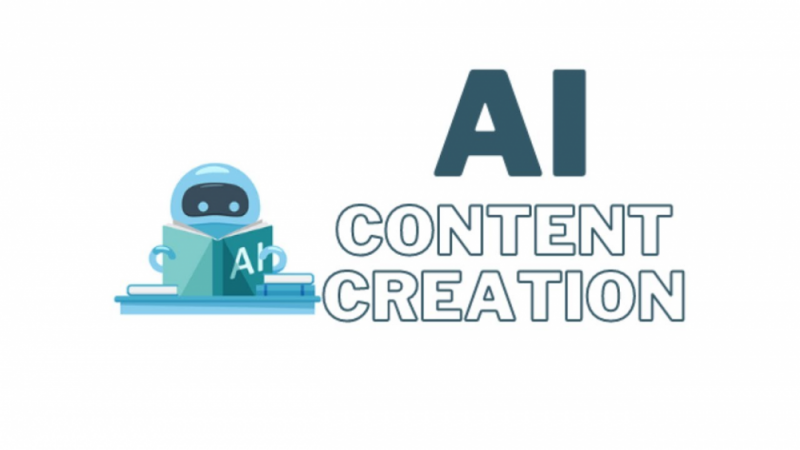The digital world is changing fast, and so is the need to come up with faster, smarter, and efficient methods of creating content. Nowadays, in this competitive world, brands and businesses cannot just stick to the olden times content writing techniques that may consume hours or even days to write a single content. This is the revolution of AI to create content. This technology is redefining the process of writing, planning, and publishing content by automating and, at the same time, providing creativity.
Learning about AI in Content Creation
Artificial Intelligence (AI) is not a buzzword anymore; it has become a constituent of contemporary marketing. Using advanced algorithms, machine learning models, and natural language processing tools to understand, generate, and optimize written material, we refer to AI that can be used to create content. These systems process data, draw patterns, and create valuable content based on user requirements a blog post, video script, ad copy, or product description.
The power of A.I. lies in the possibility to process volumes of information in a couple of seconds, which is a powerful tool in the creation of content. It can imitate human tone, comprehend brand voice, as well as alter the content style as per the target audience. This has presented fresh opportunities to the marketers and the creators of content across the globe.
Why Businesses Are Adopting AI for Content Creation
Time and consistency are important in the digital marketing environment. Those companies that are frequent publishers are likely to gain more authority over the internet. Nevertheless, it can be difficult to keep the same line with human-only teams. This is where AI would come in to assist content professionals.
Among the principal factors why businesses are turning to AI in generating content are:
- Efficiency: AI tools can create outlines or propose topics or even fully draft in minutes and considerably decrease turnaround time.
- Economical: Automation of some writing activities decreases the operational costs and enables human teams to concentrate on strategy and creativity.
- Insight: AI systems are able to process the preferences of the audience, trending keywords, and interactions in order to generate more effective content that can be promoted online.
- Scalability: You may require a single blog post or hundreds; AI tools can generate quality output in a short time, and it will not deteriorate its quality.
These advantages are why e-commerce to education industries are investing in AI-based tools to remain abreast with the current marketing requirements.
The Human Touch Still Matters
Although AI to create content is changing the way things are done, it does not imply that humans are going to be eliminated. Actually, optimal outcomes are usually reached through a compromise of machine efficiency and human creativity of humans. Repetitive work like writing product descriptions or summarizing lengthy reports can be done by AI; however, tone, addition of emotional value, and brand authenticity are done by human editors.
AI can become a co-pilot, but not a competitor, to writers and marketers. When structure and data-intensive aspects are handled by AI, humans are able to concentrate on narration, feeling, and creativity. The alliance facilitates the preservation of speed and quality, which are fundamental in the present-day digital world that moves at a fast pace.
Examples of AI in Action
At present, AI-based tools are becoming popular in various forms of content.
For instance:
- AI-driven blog writing platforms have the potential to produce article drafts that do not conflict with the requirements of SEO and the interests of the end-users.
- The video creators rely on AI to compose catchy scripts or captions for social media posts.
- Graphic design tools are a combination of automation with AI to produce visuals that supplement written texts.
All these illustrations confirm that AI is not only text-based. It is emerging as a one-stop creative assistant that assists marketers in creating multi-format content with ease.
Challenges and Ethical Considerations
Although AI has some advantages, it also carries the challenges that businesses have to be responsible for dealing with. Authenticity is one of the primary problems to consider, as it is necessary to ensure that the content produced by AI can be related to the real voice of the brand. The other is accuracy, as AI sometimes can give misleading or factually wrong information unless reviewed properly.
Furthermore, AI should be used ethically in a transparent manner. Honest and reliable information must always be offered to the audience, and the company must make sure that human control is still involved in the publishing process. AI should not be used to substitute human creativity but optimize it.
The Future of AI for Content Creation
With the further development of technologies, AI for content creation will be even smarter, more intuitive, and integrated into the digital processes. The way that the future systems will be able to comprehend the tone, emotion, and cultural details even further is that marketers will be able to personalize content on a large scale.
The effectiveness of AI in this area will, however, be determined by the effectiveness with which businesses merge machine intelligence and human creativity. It is not to allow AI to replace the writers, marketers, and brands, but to enable them to create more relevant, better, and speedier content.
Conclusion
The emergence of AI as a tool of content creation is a new step in the approach to digital marketing. AI will save time and improve quality by accomplishing tasks, including generating ideas in blogs and improving performance at work. However, the essence of effective content remains in the domain of the human mind and emotional insight. It is not merely the ease of creation of content, but AI makes it smarter when it is applied intelligently.
